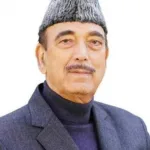Kashmir valley has a deep rooted history of music inherited in the region’s heritage. Kashmiri music is considered as a crucial part of the valley’s culture, with its roots tracing back to ancient centuries. But, with the recent technological advancements, Kashmiri music has undergone significant changes. Researchers attribute these changes to globalization and the advent of multiple digital platforms.
In contemporary times this transformation of traditional Kashmiri music represents a dynamic socio-cultural phenomenon which not only presents an intersection of traditional music with the new age modernity but also brings its revival. The digital age has emerged as a powerful tool for the art and artists to disseminate these timeless lyrics across borders into the hearts of audiences across diverse borders. “
Recently, a memorable concert was held at Mughal garden Shalimar Bagh-Srinagar featuring renowned local and German artists.
Munir Ahmad Mir, a vocalist, music composer and Kashmiri classical singer is of the opinion that the government should provide more vibrant platforms, focusing on intersection of artists. Munir has embarked on a Bollywood journey, lending his soulful voice to two songs in the film Shikara.
The importance of Kashmiri music goes beyond just beautiful melodies; but it also serves as a representation of the people and the place.
Waheed Jeelani, internationally acclaimed artist and first Kashmiri artist to sing alongside renowned artists like Udit Narayan, Kavita Krishnamurthi, and Usha Mangeshkar among others said, “I’ve been part of concerts and events in many countries showcasing Kashmiri music globally. In the UK, we presented the famous Kashmiri musical ‘Habba Khatoon,’ sharing the essence of Kashmiri Sufism through music. It’s not just me; many talented artists are promoting Kashmiri music globally, both traditional and modern. Together, we’re contributing to the exchange of cultures worldwide, helping people appreciate Kashmiri music and its rich heritage”
Kashmiri music has evolved over centuries with influences from diverse cultural, religious, and artistic traditions such as Persian, Sufi, and Central Asian. It is considered as a powerful form of cultural expression that not only portrays experiences, emotions and celebrations but also plays a pivotal role in preserving and representation of linguistic identity of the region, with many traditional and famous songs composed in Kashmiri language. It is characterized by unique instrumental styles, including instruments like the Santoor, Rabab, and Tumbaknari, that stands as a source of pride and a testament to the creativity of its musicians.
Noor Mohammad Shah, a performer and songwriter of traditional Sufi music hailing from Baki-Aker village of Handwara town, from Kupwara district says, “I used traditional Kashmiri musical instruments like staar, saran, etc., which are very common. Now if a musician wishes to incorporate a different instrument, such as a guitar, etc. it’s at the singer’s discretion. The focus should be on the basics of music which is a key to create a soulful composition, and introducing new instruments shouldn’t pose a challenge to the singer.”
In the present digital age, social media is playing a crucial role in bringing Kashmiri Sufi music at the forefront of the global music landscape. Popular platforms like YouTube, Instagram, and Facebook have become virtual platforms for artists of the region to showcase their art to a global audience in multiple forms. With the help of internet the Sufi melodies of the valley are no longer limited by location and can be enjoyed by people all around the world.
“The global recognition of Kashmiri music particularly with the help of the internet has sparked increased cultural exchange, with musicians from different countries exploring possibilities in Kashmir. This recognition has elevated Kashmiri music onto the international stage, attracting attention from diverse musical communities eager to collaborate and explore the rich musical traditions of the Kashmir region.” Said Jeelani who is also the first Kashmiri contestant on ‘Zee Sa Re Ga Ma Pa’ show of 90s.
Raja Bilal, a Sringar based vocalist, music composer & producer who has worked with Bollywood singer Dr. Jaspinder Narula and created a historic duet that bridged Kashmiri folk music with the broader Indian music scene emphasizes, “The significant impact of the internet and social media in promoting Kashmiri music. From followers to the YouTube community and various social media platforms, he highlights the ability to reach millions with just one click, making it an excellent platform for promoting Kashmiri music”.
His compositions can be heard in notable films such as “Aakh Daleel Lolich,” the first Kashmiri digital film, “Gul,” and “Kashmir Daily,” among others. Additionally, he has also collaborated with the Institute of Eastern Music and Literature, USA, and Sargam on the soul-stirring Ghazal album, “Bah-e-Tarang.”
Recently, Kashmiri Sufi music has gained widespread popularity, catching the interest of not only Bollywood but also musicians globally. The influx of artists to the Kashmir valley has not just contributed to the international music scene but has also created a platform for cultural exchange. This blending of traditional Kashmiri melodies with modern sounds has made its mark in Bollywood soundtracks, bringing a distinctive and vibrant element to the industry. This cross-cultural collaboration has not only enriched the music landscape but has also opened up new avenues for artistic expression and appreciation.
For example Noor Mohammad Shah and Abdul Rashid Hafiz, renowned popular traditional Sufi music performers and songwriters of valley have produced a sensational Kashmiri songs Nazneen & Meri Jaan respectively with thebollywood top music director Salim-Sulaiman which took social media by storm and gained wide appreciation from music lovers.
“Collaborations between Kashmiri musicians and bollywood have significantly amplified the exposure of Kashmiri music on a larger scale. It brings together diverse musical influences, blending traditional Kashmiri melodies with contemporary bollywood elements, thus appealing to a broader audience. Collaboration like these often leads to a fusion of genres, resulting in unique sounds that appeal to both traditional and modern audiences” Waheed Jeelani added, who has been the producer and host of the talk show ‘Ghar Se Bollywood Tak’ aired on Doordarshan.
In the digital age online platforms offer global reach, but it also brings new opportunities with diverse musical genres. The commercialization of music and the rise of pop culture have also altered musical preferences among younger audiences, adding new flavors to traditional music. To cater with younger audiences, some traditional Kashmiri musicians have tried mixing their music with modern styles. This mix helps blend the old and the new, keeping the heart of Kashmiri music alive. “In Kashmir, people are really into traditional music, but nowadays, some are also attracted towards mash-up songs. For that, singers are also now using different language dialects to bring our traditional folk music to life. This not only keeps the tradition alive but also helps promote our culture. Whenever I get a chance to perform with new generation singer like Ali Saifuddin & Mohammad Muneem Nazir they usually play Guitar and make I use Rabab and it doesn’t affect the quality of music but provides a beautiful blend together” added Noor Mohammad, while reflected on his touching song “Wafadaar Mooj” with Muneem Nazir, that emphasis emotional message towards mothers. The song holds a special place for him as it aims to revive the essence of love and appreciation towards parents, sentiments that seem somewhat scarce in today’s context.
The Internet and social media have revolutionized the promotion of Kashmiri music globally. In the past, Kashmiri music was limited to the valley and had a smaller audience. However, with the advent of the Internet and social media platforms the art can be shared with a larger audience. Waheed Jeelani who has also worked with US-based singer Terra Naomi on the Climate Change Song, a project that not only blended our musical styles but also raised awareness about environmental issues in this context.
“Throughout my decades of experience in this field, I have conducted several music festivals and events but with the help of the internet we are now able to explore broadcasting such shows online. We aired our show Qaraar on platforms like YouTube, Facebook, and Instagram live, reaching a diverse audience and garnering recognition internationally.
Bilal Ahmad Matta, a musician, artist, singer & composer has been among many to promote Kashmiri music. He has also been the part of the IBM Band, where they internationalized Kashmiri music by blending it with Western fusion styles. He said, “One of our notable moments I remember was when I performed live in America on the Kashmiri rhyme “Hukus Bukus,” which was highly appreciated and It was later recorded by the renowned Bollywood singer Shantanu Mukherjee (Shaan) for a movie. And today with so many media platforms like YouTube, Spotify, and Instagram, musicians now can upload their songs, videos, and performances online, allowing people from all over the world to discover and enjoy their music. This has greatly expanded the reach and exposure of Kashmiri music, breaking the geographical barriers that once confined it to the valley.”
Writer is intern with Rising Kashmir




